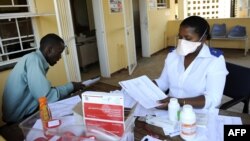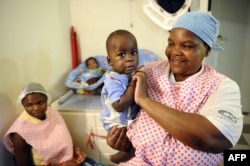Nurses in Swaziland are threatening to embark on an indefinite strike next week after the government in Mbabane failed to meet their demands for better working conditions.
Last week, leaders of the Swaziland Nurses Association presented a petition to Prime Minister Barnabas Sibusiso Dlamini's office demanding better working conditions. They also issued an ultimatum that the group would strike if the administration failed to address their concerns within seven business days.
The ultimatum expired Wednesday, but the government has yet to signal its intentions, according to Sibusiso Lushaba, national secretary of the Swaziland Nurses Association.
He says the decision to demand better working conditions was taken at a national meeting of nurses in October 2015. Lushaba says there was a consensus at the meeting that the administration in Mbabane be lobbied to improve working conditions and create more opportunities for nurses across the country.
"Nurses of the Kingdom of Swaziland … are faced with a gross shortage of nurses in the country due to a plethora of reasons. Key among them is that government is not creating enough posts for nurses. … nursing is not being prioritized in the country by the government," Lushaba said.
"We have a nurse-to-people ratio of 1:1,000 and it is decreasing by the day because the government is not necessarily creating new posts for nurses,” he said.
Several attempts to reach the office of the prime minister were unsuccessful. Officials in the prime minister's office, however, assured the nursing group’s leaders that they would get a response to their issues before the deadline passed.
Lushaba says that has not happened.
"We see that there is no political will to resolve this particular problem” he said. “It would be an unfortunate situation whereby we find ourselves with nothing else to do but … going on strike. [But] that is a process that we are going to embark on next week."
The government has often told striking public workers that it doesn't have the funds to meet their demands.
But, Lushaba says, with no medical school to train doctors, the medical needs of citizens fall heavily on nurses, who he says could soon be overwhelmed.
"Swaziland doesn't produce doctors, so we have … nursing schools that are producing nurses, and our nurses are highly trained and can compete anywhere,” he said. “So most of the work and burden of the health care delivery of this country is done by nurses. … If you continue to introduce new programs aimed at assisting the population — making sure we have a healthy population — it is also prudent that you also increase the number of staff, the number of nurses.”






